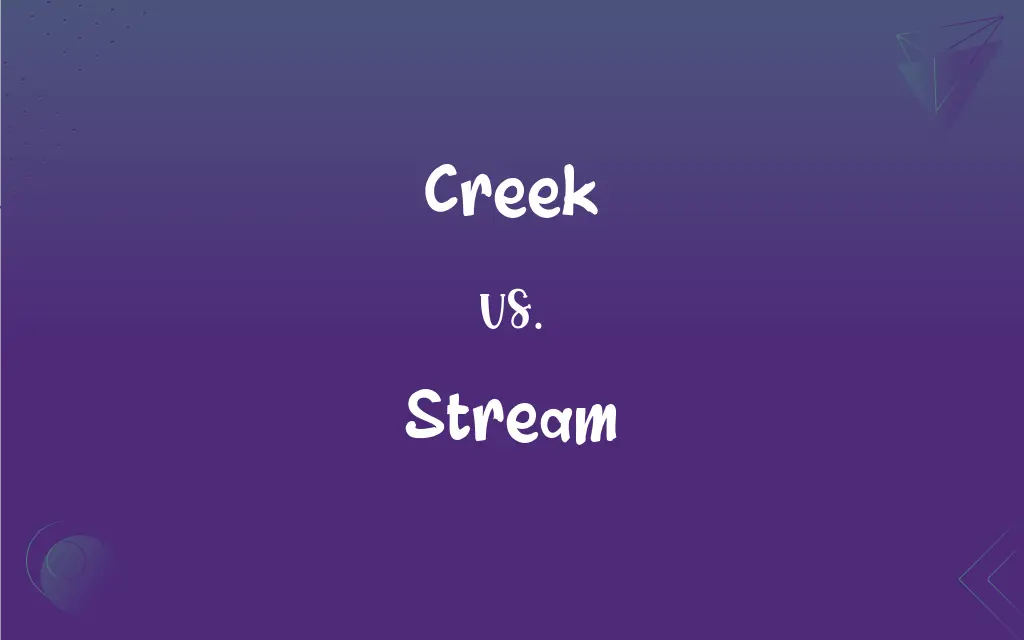Creek vs. Stream: What's the Difference?
Edited by Janet White || By Harlon Moss || Updated on July 30, 2024
Creek and stream both refer to flowing bodies of water, with creeks typically being smaller and streams being more general in size.

Key Differences
Creek and stream are both terms that describe flowing water bodies. A creek is often thought of as a smaller, more narrow body of water, often a tributary to a larger system. It might wind through a meadow or be nestled in a woodland, and is typically found in certain geographical areas. On the other hand, a stream is a more general term that can describe a water flow of varying sizes, from small rivulets to larger channels.
While both creek and stream can be found in natural settings, their usage might differ based on regional vernacular. For instance, in some areas, people might refer to a small waterway as a creek, while in other regions, the same waterway could be called a stream. These regional differences can lead to some confusion, but context usually offers clarity.
In terms of ecology, both creeks and streams play pivotal roles. A creek, due to its often smaller size, might be more sensitive to environmental changes. Pollution or deforestation can rapidly alter its ecosystem. Streams, being more varied in size, can also be impacted, but larger streams might have a more robust ecosystem that can handle certain disruptions.
From a linguistic standpoint, the terms creek and stream can also be used metaphorically. One might say they're "up a creek" to indicate they're in a difficult situation, while "stream" can refer to a continuous flow of information or data in modern parlance.
Comparison Chart
Size
Typically smaller
Varies in size, can be small or large
ADVERTISEMENT
Regional Usage
Can be specific to certain regions
More universally recognized term
Ecological Sensitivity
Often more sensitive due to smaller size
Varies, but larger streams might be more resilient
Metaphoric Usage
"Up a creek" - in trouble
"Stream of information" - continuous flow of data
Contextual Ambiguity
Might be used interchangeably with "brook" or "rivulet"
Broad term, can include many types of flowing water
Creek and Stream Definitions
Creek
A tributary or minor river.
The creek joins the river a few miles downstream.
ADVERTISEMENT
Stream
A continuous flow of liquid.
A stream of water burst from the pipe.
Creek
A small flowing body of water.
The kids played by the creek during the summer.
Stream
A flowing body of water.
The fish swam upstream in the stream.
Creek
A narrow, sheltered waterway.
The boat was hidden in a secluded creek.
Stream
A current or course of water or other fluid.
A stream of lava flowed from the volcano.
Creek
A channel or inlet in coastal marshes.
Migratory birds often nest near the creek.
Stream
A small river or brook.
The town was built alongside a stream.
Creek
A situation of difficulty (idiomatic).
If we don't find a solution, we'll be up the creek.
Stream
A continuous flow of information or data.
A live stream of the event was available online.
Creek
A member of a Native American people formerly inhabiting eastern Alabama, southwest Georgia, and northwest Florida and now located in central Oklahoma and southern Alabama. The Creek were removed to Indian Territory in the 1830s.
Stream
A flow of water in a channel or bed, as a brook, rivulet, or small river.
Creek
The Muskogean language of the Creek.
Stream
A steady current in such a flow of water.
FAQs
Can a creek be man-made?
Yes, some creeks are man-made for irrigation or other purposes.
Does every creek flow into a stream?
Not always; creeks can flow into various water bodies, including rivers or lakes.
Are creeks always smaller than streams?
Not necessarily, but creeks are often perceived as being smaller.
Are streams always freshwater?
While most streams are freshwater, there are some brackish streams near coastal areas.
What's the primary difference between a creek and a river?
Size and flow are the primary differences, with rivers being larger.
Can the word creek be used metaphorically?
Yes, such as in the phrase "up the creek" meaning in trouble.
Which is more ecologically sensitive, a creek or a stream?
Creeks, due to their often smaller size, might be more sensitive to changes.
Can the words creek and stream be used interchangeably?
Generally, yes, but regional preferences may vary.
Is a brook larger than a creek?
Terminology varies by region, but generally, a brook and creek are similar in size.
What are the sources of streams?
Streams can originate from springs, melting snow, or runoff.
How do streams affect the ecosystem?
Streams play vital roles in habitats, transportation of nutrients, and water filtration.
Can the term creek refer to an inlet in coastal areas?
Yes, in some regions, creek can refer to a tidal inlet or channel.
What's the significance of stream banks?
Stream banks provide habitat, prevent erosion, and filter runoff.
Are all creeks freshwater?
Most are, but some near coastal areas might be brackish.
What is a "data stream"?
It refers to a continuous flow of data or information.
Is it correct to say "stream of consciousness"?
Yes, it's a literary technique denoting a continuous flow of thoughts.
Do creeks freeze in winter?
Depending on the location and temperature, creeks can freeze.
How does stream velocity affect its surroundings?
It can influence sediment transport, habitat quality, and bank erosion.
What does "streaming" mean in modern tech parlance?
It refers to the continuous transmission of audio or video data.
Can a creek be navigable?
Some larger creeks might be navigable, especially by small boats.
About Author
Written by
Harlon MossHarlon is a seasoned quality moderator and accomplished content writer for Difference Wiki. An alumnus of the prestigious University of California, he earned his degree in Computer Science. Leveraging his academic background, Harlon brings a meticulous and informed perspective to his work, ensuring content accuracy and excellence.
Edited by
Janet WhiteJanet White has been an esteemed writer and blogger for Difference Wiki. Holding a Master's degree in Science and Medical Journalism from the prestigious Boston University, she has consistently demonstrated her expertise and passion for her field. When she's not immersed in her work, Janet relishes her time exercising, delving into a good book, and cherishing moments with friends and family.







































































